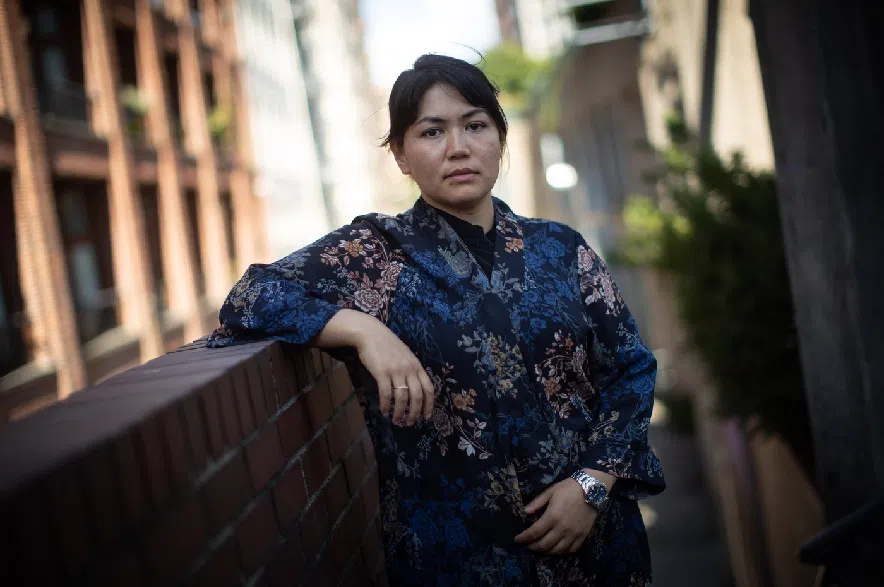Parissa Ahmadi says the least worst thing that could happen if she doesn’t make it to Saskatchewan this summer, and is deported to Afghanistan, is that she’s jailed and tortured.
The worst thing — she doesn’t like thinking about too much.
Read more:
- In the news today: Air Canada flight attendants could strike tonight
- Provincial fire ban lifted in Saskatchewan after rainy week
- Riders look to lock down duo of Bo Levi Mitchell and Kenny Lawler
“It’s not a good thing,” the recent graduate of the American University of Afghanistan’s business program said from her dorm room in Qatar.
“The possibility of being killed is really high.”
The 23-year-old is among about 30 female students who were evacuated from Afghanistan after the Taliban took over the country four years ago Friday.
An advocacy group and the University of Regina are raising money to help relocate the women to Saskatchewan to continue their education, because the U.S. government has suspended their scholarship funding in Qatar.
Friba Rezayee, the Vancouver-based founder of Women Leaders of Tomorrow, a group that advocates for the education of Afghan women, said it has been able to raise about $140,000 of the $500,000 the University of Regina needs to cover their tuition.
“It’s a death sentence for them if they are sent back (to Afghanistan),” said Rezayee.
“I can’t even imagine them returning. Everybody’s terrified. These were the writers and the most educated women in Afghanistan who wanted to have freedom, democracy, human rights, formal education before they fled.”
Jeff Keshen, the president and vice-chancellor of the University of Regina, said it has the space to provide the women with free housing and meals if the tuition is raised.
It has previously accepted a large number of students from the American University of Afghanistan, he added.
And it’s prepared to expedite offer letters for the women, as they’re highly qualified students of law, business and computer science.
But the federal government has delayed issuing student visas since it put a cap on international students last year, Keshen said.
“It’s tragic,” said Keshen.
“We might not be able to help everybody, but we as a university, as a country, can help some people … we have room on our campus, so we can actually provide to these students.”
He said he has heard from some of the women and fears for their future.
“They’re not just going back to an area where their education is going to be denied, but their hopes and dreams are going to be dashed.”
Keshen said the university has expressed to the federal government its willingness to accept the women and has told the immigration ministry they’ll need student visas as soon as the funds are raised.
A spokesperson for Immigration, Refugees and Citizenship Canada said Thursday it couldn’t comment on the university’s request due to privacy legislation and to protect the safety of those involved.
“Canada has welcomed over 59,000 Afghans since the fall of Kabul in August 2021,” said Mary Rose Sabater.
Sabater said the department continues to process eligible applications, even though its special program for Afghan refugees is closed. “Visa applications are considered on a case-by-case basis.”
Rezayee said Qatar accepted the women after receiving funding from the U.S. government for their education.
But in January, on the first day of his second term in the White House, U.S. President Donald Trump issued an executive order that froze spending on foreign aid, immediately cutting off that funding.
Ahmadi said an American refugee program that would have allowed the women to move to the United States after graduation has also ended under Trump’s administration.
The university in Qatar told the students they have leave the country by the end of August, Rezayee said.
Rezayee, who is one of Afghanistan’s first female Olympians and competed in judo, moved to Vancouver as a refugee in 2001. She said she believes Canada can help the women.
“I went to school, I got my degree and now I have my own business here. I don’t take a second of my life in Canada for granted,” she said.
She said Afghanistan is the only country in the world that bans education for women, and she hasn’t been able to sleep since learning about the students’ situation.
“They can’t even land at the Kabul International Airport. Because as soon as they land, the Taliban will ask them: ‘Where is your (male chaperone),'” said Rezayee, referring to a Taliban law that requires every Afghan women be escorted by a man when flying.
Ahmadi said members of the Taliban interrogated her and took photos of her passport as they left Afghanistan for Pakistan, where they then boarded a plane for Qatar.
She told them she was visiting an uncle.
While obtaining her degree, she worked at a Qatari immigration office and sent money to her sisters and brothers in Afghanistan. She’s the family’s sole provider, she said.
She wants to pursue more education at the University of Regina, she added.
“We believe that with the education and kindness, we can build a brighter future,” Ahmadi said.
“We are going to make everyone proud.”
This report by The Canadian Press was first published Aug. 15, 2025.
Fakiha Baig, The Canadian Press











